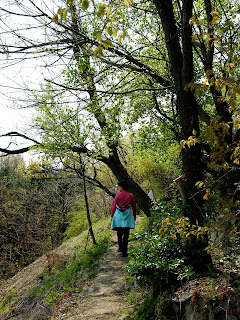A lot of this stuff is cut-pasted, mix-and-matched, or snatched from the ether that is Twitter: it's great for getting bite-sized insights, but really hard to find back a comment read one time, so parts of this post will be combinations of things other people have said, but which I can't find back. John Delury, Sino NK, Jonathan Cheng, Robert Kelly and Ask A Korean's twitter feeds have been covering this stuff in detail, so do take a moment and spend time clicking the links they share, and if anything here was in a tweet you saw, please leave a link so I can attribute it properly.
News outlets reported that North and South Korea are working on officially ending the Korean War, a war fought from 1950-1953, but which never moved beyond an armistice to an actual peace treaty or normalized diplomatic relations. After announcements of planning a summit, and indications that denuclearization is on the table, Kim Jong-un's visit to China, and Mike Pompeo's visit to North Korea, it is starting to look like the ducks are getting in a row for some actual, substantive progress in the area, something I have not suspected to be possible pretty much since I came to South Korea.
Now, prognosticators have been wrong time and time again about North Korea, both when it looked like things were headed toward normalization, and when it looked like things were headed for war. In fact, on this very blog, during my Pyeongchang Olympics downer post, I predicted that nothing would come of the two nations marching together at the opening ceremonies, and fielding a unified women's ice hockey team. Of everything I've written on this blog, and I've stuck my foot in it a whole bunch of times, I don't think there is anything I've ever said, predicted, or concluded on which I'd be happier to eat crow.
While we try to keep our hopes guarded at Roboseyo whenever it could just be that Kim Jong-un opened a new box of girl scout cookies and "All The Single Ladies" came on the radio at the same time, there are indeed indications that this is not your run-of-the-mill repeat of North Korea's patented "Global Media Attention Maximizing Friendly/Unfriendly Yo-yo Diplomacy" actTM. Let's go through some of them, and let's read/write quick, before everything goes squirrelly again.
North Korea's Strongest Position Ever
First of all, let's start off with the notion that getting together for the Pyeongchang Olympics laid some groundwork for this.
News outlets reported that North and South Korea are working on officially ending the Korean War, a war fought from 1950-1953, but which never moved beyond an armistice to an actual peace treaty or normalized diplomatic relations. After announcements of planning a summit, and indications that denuclearization is on the table, Kim Jong-un's visit to China, and Mike Pompeo's visit to North Korea, it is starting to look like the ducks are getting in a row for some actual, substantive progress in the area, something I have not suspected to be possible pretty much since I came to South Korea.
Now, prognosticators have been wrong time and time again about North Korea, both when it looked like things were headed toward normalization, and when it looked like things were headed for war. In fact, on this very blog, during my Pyeongchang Olympics downer post, I predicted that nothing would come of the two nations marching together at the opening ceremonies, and fielding a unified women's ice hockey team. Of everything I've written on this blog, and I've stuck my foot in it a whole bunch of times, I don't think there is anything I've ever said, predicted, or concluded on which I'd be happier to eat crow.
 |
| But let's not get ahead of ourselves or anything! |
While we try to keep our hopes guarded at Roboseyo whenever it could just be that Kim Jong-un opened a new box of girl scout cookies and "All The Single Ladies" came on the radio at the same time, there are indeed indications that this is not your run-of-the-mill repeat of North Korea's patented "Global Media Attention Maximizing Friendly/Unfriendly Yo-yo Diplomacy" actTM. Let's go through some of them, and let's read/write quick, before everything goes squirrelly again.
North Korea's Strongest Position Ever
First of all, let's start off with the notion that getting together for the Pyeongchang Olympics laid some groundwork for this.





























